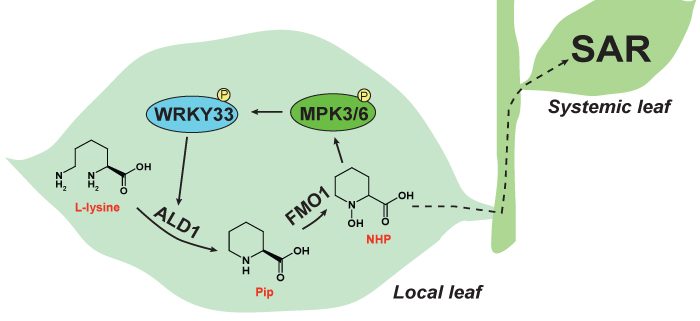A Positive Regulatory Loop for Systemic Acquired Resistance
Wang et al. find a positive feedback loop consisting of MPK3/6, WRKY33, ALD1, and pipecolic acid regulates local immune amplification contributing to systemic acquired resistance in Arabidopsis thaliana. Plant Cell https://doi.org/10.1105/tpc.18.00547
By Yiming Wang, Jürgen Zeier, and Kenichi Tsuda
Background: Plants have the ability to increase disease resistance in distant, systemic leaves after a local pathogen infection. This phenomenon is called systemic acquired resistance (SAR), which is a long-lasting and broad-spectrum resistance. Furthermore, SAR is a conserved trait in various plant species and is important for agricultural practice. Some mobile metabolites need to move from infected leaves to distant leaves to establish SAR. The lysine-derived amino acid pipecolic acid (Pip) and its derivative N-hydroxy-pipecolic acid (NHP) are regulatory metabolites necessary for SAR and have been proposed to function in SAR long-distance signaling. The enzymes encoded by ALD1 and FMO1 mediate Pip and NHP production, respectively. How expression of these key SAR genes is regulated remains poorly understood.
Question: We wanted to understand the molecular mechanism by which expression of ALD1 and FMO1 is regulated.
Findings: In the model plant Arabidopsis thaliana, we found that (1) local activation of mitogen-activated protein kinases (MAPKs) triggers SAR; (2) sustained MAPK activation induces ALD1 and FMO1 expression as well as Pip and NHP production; (3) the transcription factor WRKY33, whose activity is regulated by MAPKs, directly controls ALD1 expression; (4) MAPK-mediated SAR is disrupted by a mutation in WRKY33, ALD1, or FMO1; (5) Pip induces MAPK activation; and (6) sustained MAPK activation during pathogen infection is compromised in wrky33, ald1, and fmo1 mutant plants. These results reveal that a positive regulatory loop, consisting of MAPKs, WRKY33, ALD1, FMO1, and Pip/NHP, is a critical regulatory mechanism of SAR induction. Furthermore, we showed that Pip-induced MAPK activation requires BAK1 and BKK1, which encode coreceptors of multiple plasma membrane-localized receptors for pathogen-derived molecules.
Next steps: Our results suggest that Pip or a Pip-derived metabolite is sensed by a plasma membrane-localized receptor, a missing component in the SAR regulatory loop uncovered in this study. Identification of the actual metabolite and receptor would help us further dissect the mechanism of SAR and pave the way for development of new plant protection strategies.
Yiming Wang, Stefan Schuck, Jingni Wu, Ping Yang, Anne-Christin Döring, Jürgen Zeier, Kenichi Tsuda. (2018). A MPK3/6-WRKY33-ALD1-Pipecolic Acid Regulatory Loop Contributes to Systemic Acquired Resistance. Plant Cell 30: 2480-2494; DOI: https://doi.org/10.1105/tpc.18.00547
Keywords: Plant Defense, Systemic Acquired Resistance, Positive Feed-back Loop




